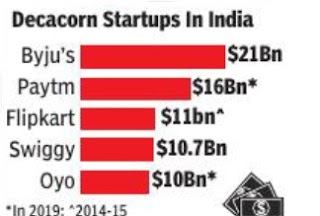Food delivery giant Swiggy is the fifth startup in India to become a decacorn after it raised $700 million in a round led by Atlanta-based investment company — Invesco.
A decacorn is a startup with a valuation of over $10 billion. The current round, which has valued Swiggy at around $10. 7 billion, witnessed participation from a slew of new investors, including Baron Capital Group, Sumeru Venture, IIFL AMC Late Stage Tech Fund, Kotak and Axis Growth Avenues.
Other decacorns from India are Byju’s (current valuation is $21 billion), Flipkart ($11 billion in 2014-15), Oyo ($10 billion in 2019) and Paytm ($16 billion in 2019).
The development comes close on the heels of the Bengaluru-headquartered startup committing close to $700 million to its quick-commerce grocery business (Instamart), which has seen increased traction due to the pandemic-led shift in consumer habits. It may soon overtake its food delivery service, said people familiar with the company’s operations. “The gross merchandise value our food delivery business achieved in 40 months, took Instamart just 17 months, demonstrating the platform benefits of Swiggy. We will double down on this to build more categories in line with our mission of offering unparalleled convenience to Indian consumers,” said Sriharsha Majety, co-founder and CEO at Swiggy.
With India’s quick-commerce market set to grow to $5 billion by 2025 from $0. 3 billion currently, according to data from RedSeer, the potential has lured a host of companies, including new kid on the block — Zepto, Zomato-backed Blinkit (formerly Grofers), Reliance-backed Dunzo and veterans such as Tata-backed Big Basket, which plans to open 800 brick-and-mortar stores.
This fund-raise will enable Swiggy to accelerate growth on its core platform and grow Instamart, which is set to reach an annualised GMV run rate of $1 billion in the next three quarters, according to the company.
Quick commerce is a new sub-vertical that allows for delivery of small quantities of goods within an hour. Ecommerce companies manage such fast deliveries through a network of dark stores, small warehouses that stock inventory, in close proximity to a consumer’s home.




No comments:
Post a Comment